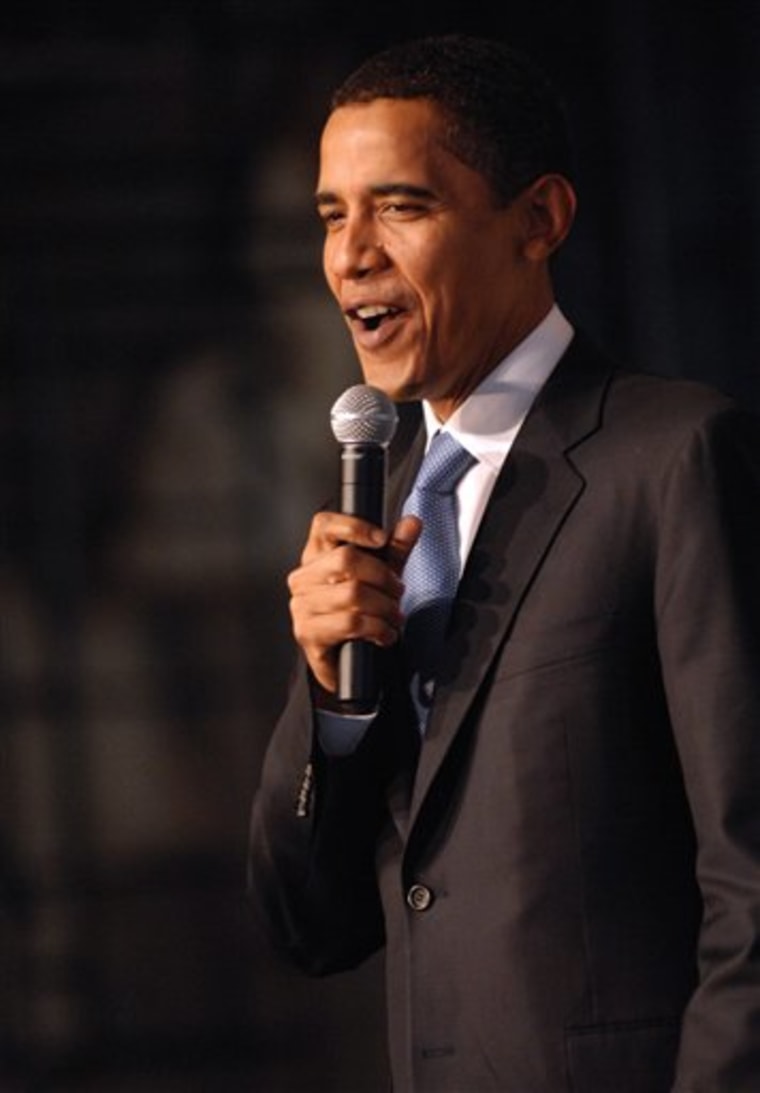The Iraq war, a defining issue of the 2008 presidential race, has turned into a proxy fight between Democrats Hillary Rodham Clinton and Barack Obama over credibility and leadership.
Obama has cast his early and forceful opposition to the war as a key test of presidential judgment. The Clinton team has begun openly challenging his claim of political purity and authenticity on the volatile issue.
The matter came to a head Monday at a forum at Harvard University, where Clinton strategist Mark Penn squared off with Obama adviser David Axelrod over the Illinois senator's voting record on the war. But beneath the squabble lay an acute recognition of the depth of voter anger over Iraq, especially among Democratic primary voters.
The Iraq factor
Polling shows most Americans now decisively oppose the war, but the figure is much higher among Democrats. An Associated Press-Ipsos poll taken last month found that 61 percent of the public now believe the war was a mistake; among Democrats, it was 91 percent.
"Iraq is the issue that is first among equals right now, and these candidates are under incredible pressure from party activists to talk about it in a detailed way," Democratic strategist Erik Smith said. "Obama is trying to be the insurgent candidate on the war, while the Clinton campaign is trying to level the playing field and change the frame of the debate."
Obama has made his early and steadfast opposition to the war a central theme of his presidential campaign. An Illinois state senator in 2002 when Congress gave President Bush the authority to use military force, Obama publicly called the proposed invasion of Iraq "dumb" and "rash." On the presidential campaign trail, he jabs at rivals who voted in favor of the invasion, casting it as a key test of political and moral judgment.
"I am proud of the fact that I opposed this war from the start," Obama said to huge cheers at a rally Saturday in Oakland, Calif. "That I stood up in 2002 and said this is a bad idea. This is going to cost of billions of dollars and thousands of lives."
On the offensive
Clinton, a New York senator who voted for the authorization in 2002, has been under siege from many party activists for her vote since launching her presidential bid. She's refused to repudiate her vote but has harshly criticized the conduct of the war, saying "if we knew then what we know now" she never would have voted as she did.
Clinton advisers insist that voters care more about ending the Iraq conflict than revisiting how it started. In recent months, Clinton has sponsored legislation capping troop levels and has spoken in detail of how she would resolve the conflict as president.
Still, the Clinton camp, keenly aware of Obama's surging popularity among Democrats, has gone on offense against his careful positioning on the war. The first signs of a new strategy trickled out late last week, when former President Clinton was quoted in a New York tabloid gossip column complaining that not enough attention had been paid to Obama's Senate votes on Iraq.
Refocusing the argument
At Harvard, Penn answered a question by bringing up Obama's Senate record. He said Obama, like Clinton, has voted for spending bills to continue funding the war. And like Clinton, he opposed an amendment sponsored by Massachusetts Sen. John Kerry last year that would have set a July 1, 2007, deadline for withdrawing troops.
"When they got to the Senate, Senator Obama's votes were exactly the same," Penn said.
The claims provoked an immediate retort from the Obama campaign, which on Tuesday released a video and a detailed compilation of Obama's public statements opposing the war since his debut on the national stage.
"On the most important issue of our time, both for the primary electorate and the country, Barack Obama got it right," Obama spokesman Robert Gibbs said.
Clinton and Obama both support legislation that would remove most U.S. troops by March 1, 2008.
For her part, Clinton refused on Tuesday to engage in the debate, leaving that to her surrogates.
"I think what unites Democrats is much greater than what divides us and we need to stay focused on trying to rein in the president and reverse this escalation and begin to bring our troops home," she said.
Most observers agree that Obama remains the most consistent anti-war candidate. Still, Democratic strategist Mary Ann Marsh said that shedding light on Obama's Senate votes on Iraq was an effective way for the Clinton campaign to recast the discussion.
"Barack Obama is portraying himself as a new fresh face who is different from Hillary Clinton and most people in the Democratic Party establishment," Marsh said. "What the Clinton campaign is saying is 'Wait a minute, let's see who Obama really is.'
The Clinton campaign tried a similar approach last month when Hollywood mogul David Geffen criticized Clinton on Iraq and other issues. Geffen was once a major financial backer of President Clinton but is supporting Obama this time.
Clinton aides called on Obama, who has advocated a high-minded, mud-free campaign, to denounce Geffen's comments and return his money.
